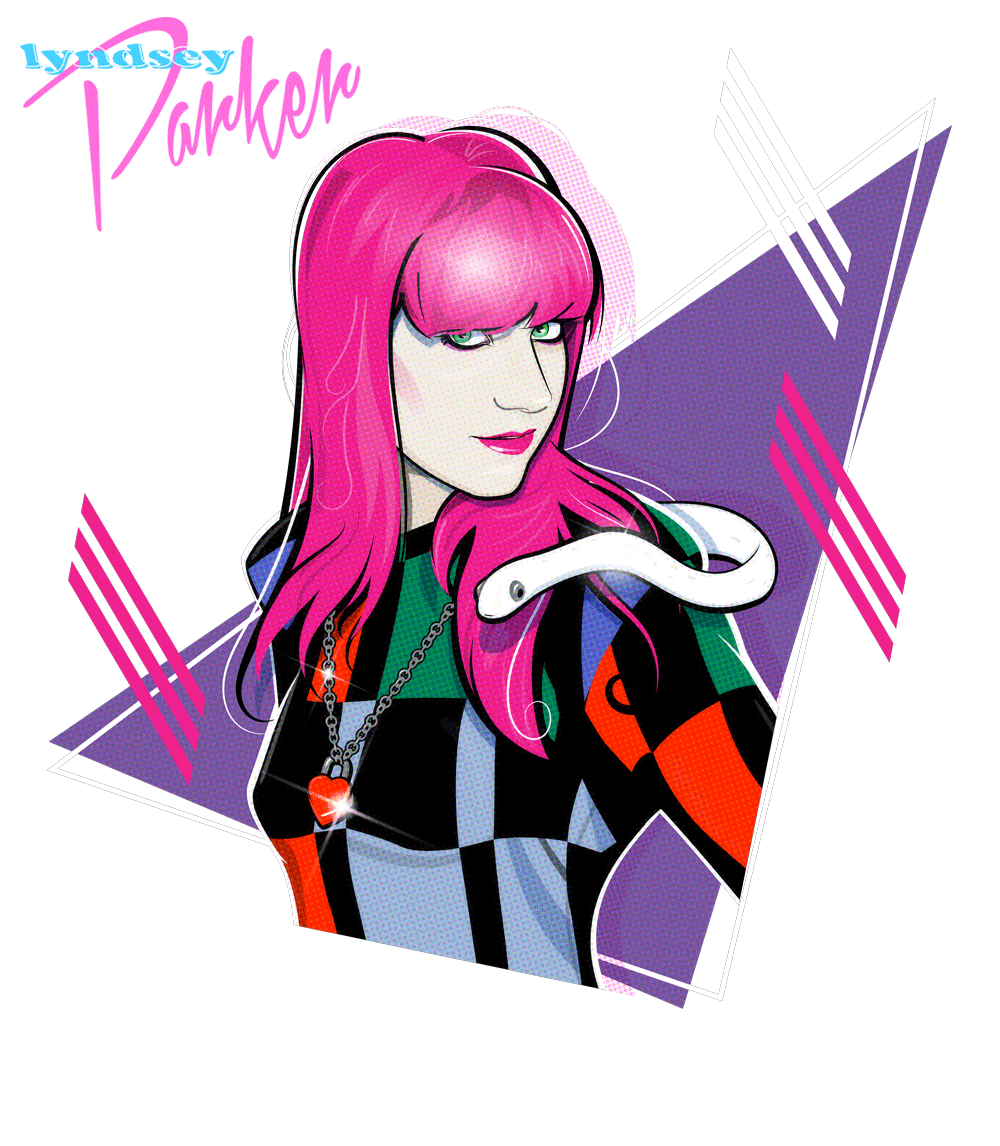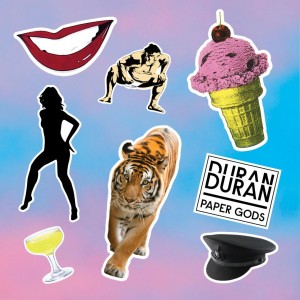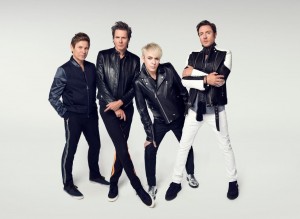With Paper Gods, Duran Duran’s triumphant new album (their first for Warner Bros. and 14th overall), the iconic new wave/post-punk pioneers and gracefully aging former teen heartthrobs are at long last getting the acclaim and respect they deserve. However, they did just get passed over, again, for nomination into the Rock and Roll Hall of Fame – in the same year that an anonymous industry insider infamously told Billboard that “mascara bands” (i.e., Duran and their ‘80s peers like Depeche Mode) will never, ever make it into the Hall. But D2’s always-mouthy mouthpiece Simon Le Bon just shrugs this off.
“I have a problem with the institutionalization of rock ‘n’ roll,” Le Bon tells Yahoo Music. “I don’t like going places where you’ve got to wear a black tie. I just feel like saying, ‘F— off!’ I think the Rock and Roll Hall of Fame in itself is not a bad thing, but I don’t feel that I have to be placed alongside Jerry Lee Lewis, James Brown, the Rolling Stones, U2, and all those other guys for me to have validity. The validity that counts to me is those kids that are going be standing outside in the car park [at our concert] this afternoon. You sell one single record, and it means 100 Rock and Roll Halls of Fame.”
Duran Duran have sold more than one single record lately: Paper Gods recently debuted on the Billboard 200 at No. 10, the band’s highest chart position in more than 20 years. And that’s thanks largely to the fans, the Duranies, the diehards that Le Bon says “have supported us through good times and bad.”
“This was the first album we started using the word ‘brand’ in the conversation a lot,” confesses Duran Duran bassist John Taylor with a sheepish grin. “And I think when you’re dealing with a brand, the conversation is almost always, ‘How do we maintain the classic aspects, what people come to know?’… It was very important to us that our fans loved this record. Of course you’re always hoping that it’s going to broaden out, but it was important that the kids who were outside our studio every day, that they loved this record. And you can feel this pride moving through the fanbase with this new album, and what we’ve been seeing on the tour dates is fans who haven’t been to a Duran show in over 10 years sort of dusting off the T-shirt and coming back. And that’s been really gratifying.”
“If you follow an artist for a long time, and they suddenly come out with something that everyone else is talking about, it gives you currency and you validity as a fan,” adds Le Bon proudly.
With Paper Gods, Duran Duran – Taylor, Le Bon, and fellow original Fab Five members Nick Rhodes (keyboards) and Roger Taylor (drums) – have thrillingly struck the perfect balance between their last effort, 2010’s blatantly retro, Rio-reminiscent All You Need Is Now (“sort of [producer] Mark Ronson’s concept of taking the Rio sound and the Rio moment and trying to recreate that sonically,” says Taylor) and 2007’s ill-fated, if misunderstood, Timbaland-produced electro experiment Red Carpet Massacre, which Taylor admits “let go of any tie to that classic Duran Duran sound” and was a major miss with fans and critics alike.
“I think as albums go, Red Carpet Massacre was overlooked,” Le Bon stresses. “But it was the wrong album for the fans, and if the fans don’t get it, they don’t give it that initial boost, which gives it the chart position which everybody takes notice of.”
“We were ready with this album [Paper Gods] to really mix it up. We all love contemporary music, we’re always constantly listening to what’s going on,” says Taylor. “So there are things we listen to all the time and say, ‘Can we incorporate this into our sound? But at the same time, is it at the expense of something?’” So the band recruited a cast of impressive guest characters – Janelle Monae (on the vivacious lead single “Pressure Off”), Mr. Hudson, Nile Rodgers, Mark Ronson, John Frusciante, Mew’s Jonas Bjerre, and Kiesza, whom Le Bon actually discovered when he saw her groundbreaking “Hideaway” music video playing in his gym. The resulting album boasts a sleek, bold, updated sound that stands up alongside Duran Duran’s vintage material, but is still fresh enough to earn a ringing endorsement even from Pitchfork.
“That’s one of the really important factors in the longevity of Duran Duran,” says Le Bon. “The fact that we’ve invested the time in going to studio, and the emotional investment as well… This album, Paper Gods, we dug for about a year before we got a good scene of ideas and kind of found the direction… And it was because we put the energy in, we’ve got the songs which we can go out with now, which are turning people on who are new to Duran Duran. It’s quite rare in this industry for people to do that anymore, and I think a) we deserve it because we put the work in but b) we’re very fortunate as well. We’re very lucky people. We’ve got an amazing fanbase.”
Paper Gods has received mostly glowing reviews, but Taylor says with a shrug, “We’re kind of immune to [rock] criticism now. When we came out, the first few years, the critical press was really heavy. We had a rough ride, you know? And the kind of press that considers itself significant did not get on ‘Team Duran.’ So we learned very quickly to not lean on that at all. So sure, as it’s come back, I suppose after the last few years, we’ve had good press… but…”
“The thing is, if you read the good stuff, you’ve gotta read the bad stuff too,” Le Bon interjects. “And that can be depressing… The critics, I mean particularly the press, the actual people who write in magazines like NME, Sounds, those kind of things in the ’80s, all of those establishments were completely dominated by guys who had their idea of what an entertainer should be. And we did not fall into that category. And the fact that we were liked by girls gave them two things: It made [critics] jealous, and the way they dealt with it was to say ‘a female following is not a real following.’ And we’ve definitely suffered from that. And you know what, we’re still around – and they aren’t!”
Duran Duran are reluctant to pinpoint an exact time when the critical tides started to finally turn for them, but Le Bon cites “one review that really meant something to me. In 2012, we played on the night of the Olympic concert [in Hyde Park]… And when it was announced that we were playing it, a guy [from the NME] called Tony Parsons really laid into us and really, really got the knives out,” Le Bon recalls. And then, shockingly, it was Guardian journalist Paul Morley – a man who’d written that he’d “hated Duran Duran for 30 years” – who came to the band’s defense. “[Morley] said, ‘You know what? This Tony Parsons guy is talking a lot of crap. I’m not a fan of Duran Duran. I used to really dislike them. I’m not going to go out and buy all their records. But I have to admit I have a grudging respect for them to survive in a really, really tough world.’ And for me, that really meant everything. That really mattered.”
“You have to be very accepting of the narrative,” says Taylor reflectively. “We’re older now, and we talk a lot about dealing with the ride when we were kids. It was all emotion; we were reacting to everything with pure emotion. Now you can understand. I don’t look at any album and think, ‘Oh, that was overlooked.’ I feel like it was exactly the right album, it did exactly what it was meant to do. It’s that philosophy of feeling good about who you are right in this second. And if you feel good about the seat you’re sitting in, you can feel good about the path that got you there.”
Duran Duran may never gain entry to the Rock and Roll Hall of Fame, but almost four decades into their career of wildly careening ups and downs, they realize that they have a rightful place in pop history – and in the hearts and record collections of those devoted, longtime fans who literally worshipped Duran Duran as “paper gods” back in the day, plastering their bedrooms and school lockers with the group’s glossy pinups and posters.
“Speaking from my own experience, there were half a dozen or dozen artists when I was a teenager, and they changed my life. And so I will be forever grateful,” says Taylor, looking back at his own childhood musical heroes. “I mean, I can’t ever pay back Paul McCartney, or George Harrison, or Johnny Rotten, or Joe Strummer, or Bryan Ferry for what they gave to me. They took me out and gave me a life. They took me out of this little life that I had and gave me this incredible career. And I think that when you’ve moved people, when you’ve got into people’s life into that way, you’re always going to have this significance to them. And that is the core of what we have when we put a record out.”
Follow Lyndsey on Twitter, Instagram, Facebook, Google+, Amazon, Tumblr, Vine, Spotify
This article originally ran on Yahoo Music.










